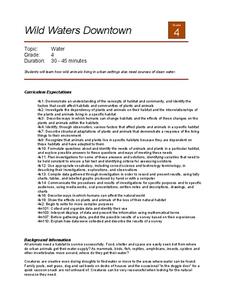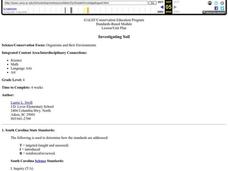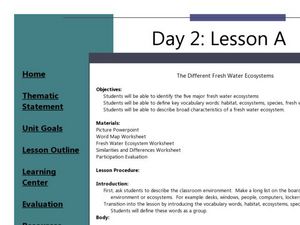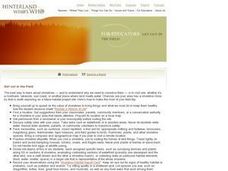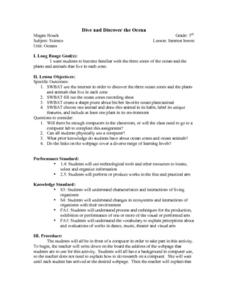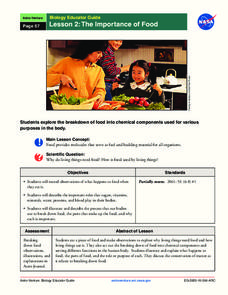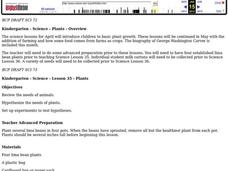Curated OER
In Your Own Backyard
Young scholars observe organisms in their habitat and record their observations. They then draw conclusions about the organism's habitat needs and food sources.
Curated OER
November Science
Students review that all people, plants, and animals live on Earth. They classify objects found in the environment as living or nonliving.
Curated OER
The City From the Ooze
Learners investigate the life in the mud found around ponds. They create Ooze City using pond mud. Students investigate the various layers that form and what type of organisms are in the mud.
Curated OER
Wild Waters Downtown
Fourth graders investigate how wild animals living in urba settings also need sources of clean water. They discuss the open water issues of West Nile Virus and what happens to urba animals as these poolings area are cleaned up. ...
Curated OER
The Chain Gang
Students perform a food chain simulation to determine what happens when a food chain is broken.
Curated OER
Investigating Soil
Fourth graders swap local soil samples with another school and examine the differences. They research soil properties, identify organisms that live in soil, create and maintain a biome of soil decomposition and design a poster to present...
Curated OER
Our Environment
Students engage in a literature study that helps students to connect with some of the issues of conservation. They list parts of the environment that need protection with the help of a graphic organizer. Then students discuss in groups...
Curated OER
The Different Fresh Water Ecosystems
Students summarize the characteristics of an ecosystem. In this biology instructional activity, students identify five major fresh water ecosystem. They define terms and write a journal about what they learned.
Curated OER
Get Out in the Field
Students visit a shoreline--of an ocean, a lake, a pond, a riverbank, etc., survey it and record what they find there. They map the shoreline and surrounding area and conclude where potential waterfront projects could occur.
Curated OER
Dive and Discover the Ocean
Third graders investigate the three zones of the ocean and the plants and animals that live in each zone. Projects produced are shared with classmates in a share circle where the unique features of the animal and zone selected are...
Curated OER
Gwynns Falls
Students investigate the question: What is the impact of urban development and expansion on the health of a decidious forest ecosystem and humans? They examine the issue of land development by responding to a specific scenario and...
Curated OER
Make an Edible Coral Reef
Students create an edible coral reef out of food and candy. In this Science lesson plan, students explore what a coral reef is and the coral reef's importance to the ecosystem. Additionally, students discover the different parts of a...
Curated OER
Rainforest Deforestation and the Water Cycle
Students create terrariums (mini rainforests). They observe and discuss the life processes that occur in their terrariums and how changes in these processes affect the plants and organisms inside. They collect and graph data and present...
Curated OER
Sink or Float
Students construct clay boats and predict whether the boats will sink or float. Students will hypothesize what caused the boats to sink or float.
Curated OER
From Caterpiller to Butterfly: Cycles, Circles, and Patterns
Students examine art of butterflies and discuss what they know about the insect. They create their own butterfly puppets and write a story to represent its life cycle.
Curated OER
Land Use Issues
Students discover seeds are a source of life. They also label the parts of a seed and examine the conditions which are needed for the seed to start growing. They follow the life cycle of seeds.
NASA
The Importance of Food
Pupils make observations while eating food. They act out the process of food breaking down in the body and the roles of various chemical components, such as sugar and protein. It concludes with an activity illustrating the process and a...
Education World
Every Day Edit - Gandhi
In this everyday editing worksheet, students correct mistakes in a short paragraph about Gandhi. The errors range from punctuation, capitalization, grammar, and spelling.
Curated OER
A Day in the Life of a Child in Accra, Ghana
Students list similarities and differences about their lives in comparison to the life of a child living in Accra, Ghana today. Students share what they think about the life of a child in Accra, Ghana.
Curated OER
Negative Toss
Students discover that they have control over their lives and over which aspects of their lives they choose to concentrate on. They throw away their negative feeling in this activity
Curated OER
Plants
Students review the needs of animals, hypothesize the needs of plants, and set up experiments to test hypotheses.
Curated OER
Everyday Life In Africa
Students compare the life of a boy in Africa with their own lives. Students act out stories that they have written in groups.
Curated OER
Shared Reading: Greedy Cat's Breakfast
Students explain they need food to live and grow. They discuss their favorite breakfast foods. They create a graph of breakfast foods.
Curated OER
Ecosystems
Third graders identify and define an Ecosystem and the basic needs of all animals. They collect pond water in a pickle jar. They observe the organisms that are in the jar to keep an ongoing record of the creatures and their population.





